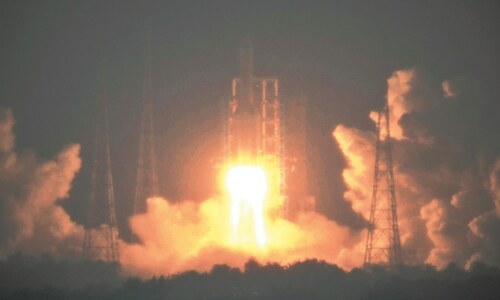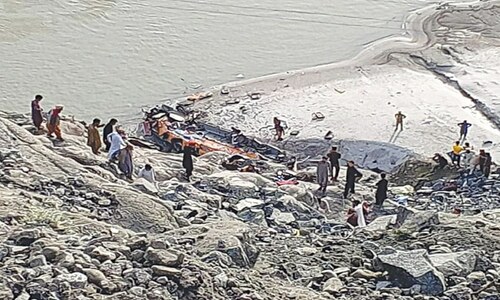 ISLAMABAD, Oct 25: Turkish President Ahmet Necdet Sezer on Thursday supported the idea of forming a broad-based government but stopped short of saying anything about inclusion of moderate Taliban in the proposed future political setup in Kabul.
ISLAMABAD, Oct 25: Turkish President Ahmet Necdet Sezer on Thursday supported the idea of forming a broad-based government but stopped short of saying anything about inclusion of moderate Taliban in the proposed future political setup in Kabul.
“This is not the right time to talk about whether this or that group should be included in the broad-based government,” Mr Sezer said at a joint press conference with President Gen Pervez Musharraf here at the President House.
The Turkish president, however, underlined the need for ensuring representation to all the social and ethnic groups in the future political dispensation in Afghanistan, mentioning the word ‘Pakhtoon’ in particular.
“What is important is that the Pakhtoons, who constitute the majority of the population, should be included along with the other ethnic groups,” he said when quizzed point-blank what his view was about including moderate Taliban in the future government.
Earlier, President Gen Pervez Musharraf, in his speech had stated that they agreed on the need for establishing a broad- based and multi-ethnic government, freely chosen by the Afghan themselves without any outside interference.
“Former King Zahir Shah, political leaders, Afghan tanzeemat (organisations), moderate Taliban, elements from the Northern Alliance, tribal elders, Afghan living outside their country — all can play an important role in achieving this objective,” President Musharraf said.
On Kashmir dispute, the Turkish president said that this issue should be resolved according to the aspirations of the people of Kashmir and on the basis of international law through dialogue.
President Musharraf in his opening statement had also called for resolution of Cyprus dispute through peaceful means.
“President Sezer and myself reiterated our support for a just and peaceful settlement of both Kashmir and Cyprus issues,” President Musharraf said.
Mr Sezer thanked Pakistan for lending support to Turkey on Cyprus issue.
On the question of Kashmir, Turkey had made some representations in the Organization of Islamic Conference, he recalled.
The resolution of Kashmir issue was essential for establishing peace in the South Asian region, he remarked.
About deployment of peacekeeping force in Afghanistan, President Musharraf said the matter could be taken up only after a political setup was established in Kabul.
Once the political strategy is evolved and put to work, one needs to see then what kind of force under the UN umbrella is required in that country, he said.
At that stage, it could be decided as to what extent the Muslim world could contribute to the peacekeeping force, he added.
When asked to comment on the general apprehension that after Afghanistan, the coalition effort to fight terrorism might be diverted to the freedom struggles going on in Kashmir and in certain other parts of the Muslim world, Mr Sezer referred to the UN Resolution 1373.
He said the resolution talks about terrorism and what kind of sanctions can be imposed against terrorism. He underscored the need for taking that resolution as a basis to evolve a universal definition of terrorism under the umbrella of the United Nations.
“We must come up with a definition on which we can agree,” he said, adding that once such a definition was evolved it could also be referred for endorsement to other international organisations including the European Union and Organization of Islamic Conference.
However, Mr Musharraf added that it was their job to ensure that legitimate freedom struggles being waged for the right of self-determination must be clearly separated from terrorism.
“What is happening in Kashmir is a struggle for the right of self-determination.”
He said there was an understanding that a freedom struggle was going on in Kashmir and “there is no question of equating it with terrorism.”
A Turkish journalist asked President Musharraf about his views on Osama bin Laden. He said that some evidence, which indicated Osama’s links to the terrorist attacks in the United States, had been shown to them.
Regarding the pro-Osama or pro-Taliban demonstrations being held in the country, he said that an extremist minority was behind these protests. He asserted that a vast majority of the people of Pakistan did not share their views.














































Dear visitor, the comments section is undergoing an overhaul and will return soon.